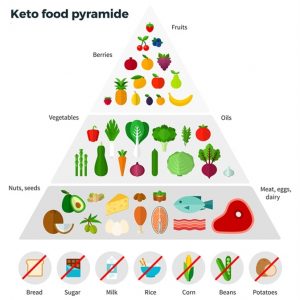The fragrance of ketones permeates the air as we explore the debate surrounding these mysterious compounds. Are they the key to unlocking our potential as human beings, or do they bring us to a precarious crossroads? Let’s explore the good, the bad, and the ketones – a surprisingly dangerous yet widely studied topic that may unlock new pathways of thought for all of us.
Table of Contents
- 1. Processing the Three Different Types of Ketones
- 2. Exploring the Benefits of “Good” Ketones
- 3. Recognizing the Risks of “Bad” Ketones
- 4. Understanding How to Utilize Ketones for Optimal Health
- 5. Navigating the Unfamiliar Ketones Landscape
- Q&A

1. Processing the Three Different Types of Ketones
Ketones are useful organic compounds used in numerous industries, and their production requires careful processing. Depending on the type of ketone, the processes may vary. Here is a breakdown of how to process the three different types of ketones.
Primary Ketones: Processing primary ketones is relatively simple and straightforward. All that’s needed is to heat them up in a reaction chamber. However, it’s important to keep the temperature under control to reduce the risk of producing a racemic mixture.
Secondary Ketones: To process secondary ketones, start the reaction with a good strong base, such as sodium hydroxide. This will react with the ketone to form an alkoxide, which can then be isolated and used in further reactions. Additionally, you may need to use a catalyst to speed up the reaction and improve yield.
Tertiary Ketones: Tertiary ketones require more specialized techniques for processing than the other two types. Most commonly, they are first reacted with Grignard reagents. This produces a tertiary alcohol, which can then be converted into an alkyl halide for further reactions.
2. Exploring the Benefits of “Good” Ketones
Ketones are a group of molecules that are essential for the metabolism and overall homeostasis of your body. This makes understanding the advantages of higher-than-normal “good” ketones incredibly important.
- Enhancing Metabolism: High ketone levels can improve an individual’s metabolic rate, resulting in higher calorie and fat burning processes. It can help you to maintain a healthy weight or lose weight if that is your goal.
- Supporting Cognitive Function: Another benefit of good ketones is the support it provides for brain functioning. Ketones can provide a source of energy that your brain isn’t able to produce efficiently, allowing it to take on more complex tasks.
- Boosting Endurance: If you’re looking to increase overall endurance, then good ketones can help out here too. Research has found that athletes that utilize ketosis as a means of fueling their body are more likely to be able to push their physical limits further than usual.
- Reducing Inflammation: Good ketones can naturally reduce inflammation responses within the body. This is beneficial for those looking to reduce soreness related to exercise, while also providing other health benefits associated with reducing inflammation.
It’s important to consider the side effects of increased ketones as well, since they can result in some changes in mood and energy levels. But, overall, good ketones are an effective way of achieving metabolic benefits and improved fitness outcomes. They can be a great addition to any diet or exercise program, and can help you to achieve the results you’re looking for safely and in a time- and cost-efficient manner.
3. Recognizing the Risks of “Bad” Ketones
High levels of ketones can be dangerous, especially if they get too high. Being able to identify the signs of ‘bad’ ketones can help you prevent any serious health issues.
Ketones are substances that are made when fat is burned for energy instead of glucose. They are usually harmless, and some people measure them as a way of monitoring their progress in a ketogenic diet or ketosis. However, there are several common signs that point to the presence of ketone levels that are too high in the body:
- Extremely fruity or sweet-smelling breath.
- Nausea, vomiting, bad headaches, weakness, confusion, and even coma
- Low Pee pH Levels (too acidic)
- Acetone on breath, skin, and even urine
If you spot any of these issues, it could be a signal that your body has too many ketones, and you need to take action. Even mild dehydration or a change in diet can push ketones higher than you want them to be. If you think your levels are too high, try drinking more water and/or temporarily reducing your intake of ketones, and see if your condition improves.
4. Understanding How to Utilize Ketones for Optimal Health
Ketones are produced naturally by the body when it is using fat for energy, and have been used therapeutically for centuries. In recent years, their versatile health-promoting properties have made ketones increasingly popular in holistic health circles. It is now possible to use ketones in supplement form to encourage metabolic health and alleviate bodily inflammation.
Taking ketones for optimal health is a multi-faceted process, the key of which is to understand how they interact with metabolic and bodily functions. Ketones help the body create energy, allowing it to reach peak performance. They also act as anti-oxidants, helping to reduce free-radicals that cause oxidative stress and disease. Unsaturated fats are necessary for the body to absorb the beneficial qualities of ketones. Furthermore, consuming protein along with ketone supplements can increase their effectiveness.
- Ketones create energy. This helps you reach peak performance and operate at an optimum level.
- Ketones act as anti-oxidants. This can help reduce oxidative stress, and the damage caused by free radicals.
- Unsaturated fats facilitate absorption. This helps the body to effectively utilize ketones.
- Protein aids absorption. Consuming protein along with ketone supplements can increase the potency and effectiveness of supplementation.
5. Navigating the Unfamiliar Ketones Landscape
Navigating a new landscape of ketones, or more specifically, ketone supplementation, can be daunting for the novice. Here are five helpful tips to ensure a smooth transition into this unique world.
- Do your research – It’s important to know as much about ketones as possible before embarking on your journey.
- Start slowly – Don’t worry about trying to have everything all at once. Take your time and ease into it.
- Choose quality products – Quality is always a key factor to consider when selecting ketones for supplementation.
- Try different flavors – As you continue to work with ketones, it’s important to have variety. There are a multitude of flavors available that can help make your journey more exciting.
- Understand the nutrition plans – Nutrition is essential to any supplement regimen, and ketones are no exception. It’s essential to understand the basics of your particular nutrition plan in order to get optimal results.
The ketones landscape is full of possibilities for those seeking to make a difference in their health and performance. By researching your options, selecting quality products, and occasionally experimenting with different flavors and nutrition plans, you should be well on your way to making the most out of this fascinating new world.
At the end of the day, it’s clear that ketones bring both good and bad to the table. Though ketosis can be complicated and must be managed carefully, its benefits can be invaluable for anyone looking to improve their health. For more information, continue exploring the ketonic lifestyle today.











